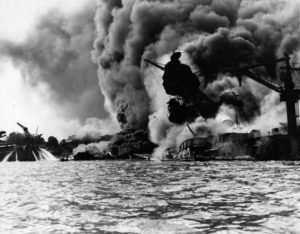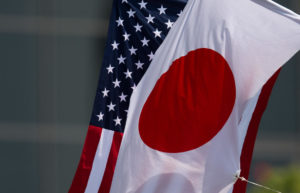The idea of apologies by current leaders of a given nation for their country’s past deeds, especially long past, is complicated at any number of levels. The specific example before us is, of course, Prime Minister Shinzo Abe’s visit yesterday to Pearl Harbor. Many have called for Abe to apologize for his nation’s unjust assault. But, really, how does one apologize for other’s offenses about which one had himself nothing to do? Abe is not, neither as an individual nor as a Japanese premier, guilty of the attack.
We mean, of course, that Abe, like any national leader, represents the people he governs and, therefore, can, and does, speak on their behalf. But how does one generation speak for another, even if elements of that former generation still live? Moreover, might not an apology say more about the contrition of a particular national leader than it does about the people’s? How do you measure the sorrow of a nation anyway? By national referendum? By a congressional or parliamentary vote? Even then, can an apology really represent the sentiment of an entire people or is it enough that it is a kind of snapshot of the conscience of a particular generation in a particular moment? As Obama’s own so-called apology tour made plain, a national leader can say sorry for any number of national sins, real or imagined, without ever truly representing the state of soul of large swathes of the nation. So what, really, is the value of an apology from a national leader?
Forgiveness through reconciliation is a core element of the Christian ethic, more than this—it is the very heart of the faith. No Christ, no Christianity. Even Christian belligerence is mobilized toward this aim. The proper end of a just war is peace—reconciliation with the enemy. While the satisfaction of the justified causes for any war are a first concern—the punishment of evil, the rescue of the innocent, or the taking back of what was wrongly taken—even the means of achieving these intended aims are qualified by the hope of reconciliation.
For Christians, this prospect proceeds in two moments. From the victim’s perspective, the first is a unilateral responsibility. One forgives as an act of compassion—recognizing that we cannot know how history and the human will have conspired to move the resolve of those who have committed offenses against us. Empathy demands that, even as we condemn and work to overturn the offense, we recognize that, quite possibly, but for the grace of God there goes me. Such a kind of forgiveness. But the second moment of forgiveness is not a unilateral of the victim but must, instead, be withheld pending the repentance of the offender. Such repentance is marked by the offender’s cessation of the offending behavior, the condemnation of the offense, and the credible promise to never do it again, followed, ideally, by restitution. Following such contrition, the victim is now in a position to grant forgiveness as an act of absolution. This might not mean the full restoration of relationship, wounds sometimes run too deep for that, but it may mean a general willingness to coexist in the same geographic space—a small town, a jobsite, a church, or even, in the case of states, simply in the same global community.
From the initial announcement of Abe’s plan to visit Pearl Harbor, it was made clear that he would offer no apology for the attack. Instead he said he was making the trip to “commemorate victims as the prime minister of Japan, as the representative of the Japanese people.” He elaborated, “I am very much looking forward to sending out a strong message on the value of reconciliation, as well as our sincere prayer for the souls of the war dead.” These intentions played out in yesterday’s visit.
After touring the site with President Obama and placing a wreath at the USS Arizona memorial, Abe presented an address. He began by reemphasizing the official nature of his visit, “I stand here at Pearl Harbor,” he again asserted, “as the prime minister of Japan.” And then he spoke about the lives his nation took one December morning:
Each and every one of those servicemen had a mother and a father anxious about his safety. Many had wives and girlfriends they loved. And many most have had children they would have loved to watch grow up. All of that was brought to an end. When I contemplate that solemn reality, I am rendered entirely speechless.
Before leaving the Arizona memorial, Abe noted, he cast flowers “on behalf of the Japanese people, upon the waters where those sailors and Marines sleep.” He then, again, reasserted his representative status, proclaiming:
As the prime minister of Japan, I offer my sincere and everlasting condolences to the souls of those who lost their lives here, as well as to the spirits of all the brave men and women whose lives were taken by a war that commenced in this very place, and also to the souls of the countless innocent people who became victims of the war.
He then reiterated his nation’s commitment to peace, insisting: “We must never repeat the horrors of war again. This is the solemn vow we, the people of Japan, have taken…never again to wage war.” If Abe means this in a general sense, it is an example of overlearning the lessons of history. No nation can possibly pledge never again to wage war and have any real hope of remaining a nation for long—unless they have powerful friends who defend them in proxy. Given that Japan’s professed commitment to pacifism seems to be in retreat of late, it might only be that his commitment is to never again launch a war of aggression, particularly against the United States. In other words, he was vowing continued friendship.
Much of this seems to meet the conditions necessary for that last full measure of forgiveness. But not entirely. While Abe’s poignant reflection on fallen Americans seems to prove his sorrow, to be sorry about something is not the same thing as being sorry you did it.

Abe not only didn’t apologize for the attack, he never made terribly clear that Japan was to blame for it. His odd locution that “a war commenced in this place” is rather sparse on detail. It might have been better phrased to make clear that precisely what commenced in that place was a Japanese sneak attack on a country with which it was not at war. Because of that, it was for all intents and purposes an immoral assault on noncombatants in which 2,400 American servicemen were killed, and nearly 70 civilian men, women, and children.
Abe’s omission of these details renders doubtful the accuracy of Obama’s top Asia advisor Daniel Kritenbrink’s claim that the Pearl Harbor visit “is the result of years of efforts at all levels of our government and societies, which has allowed us to jointly and directly deal with even the most sensitive aspects of our shared history.” My quibble is with the “directly deal” phrase. Abe did not, in fact, directly deal with his nation’s assault on Pearl Harbor. To have done so, even without issuing a formal apology, might have gone some distance to satisfy those who, like US Navy veteran Louis Conter, wanted to hear Abe say “Sorry.” Conter, who was on the afterdeck of the USS Arizona when its front section was hit, insisted “I have no bad feeling toward the Japanese. But Abe should face up to history and apologize.”
Further, had Abe properly faced up, he would have rendered more distinct the differences between Obama’s lack of apology during his visit to Hiroshima and Abe’s at Pearl Harbor. About the only thing the two events have in common is that they were terrible acts of war. But as I’ve said in various ways many times in these pages, not all terrible acts of war–nor all terrible acts of force–are the same. Considerations regarding justification, necessity, proportionality, alternatives, and intended ends all shape the moral dimensions of an act. For these reasons, I have argued, it was appropriate that Obama not apologize for the atomic assault. But for the same reason, it should be clear that Abe has cause to the contrary.
Be that as it may, Abe’s words and his nation’s actions subsequent to WWII suggest both real sorrow for the war and a real commitment to stand in alliance with the United States. Accepting this arrangement is to beg the question whether the conditions necessary for forgiveness can be met by one’s enemies without words. Can actions replace language? Looking at the real friendship between two old belligerents, the answer seems to be “yes.” But Japan’s credible condemnation of their own wartime actions would help render the healing complete. One’s enemy can cease their belligerence and vow never to do it again simply because you’re successfully kicking in their teeth. Contrition signals something more. People like Louis Conter deserve to hear Abe acknowledge that what Japan did on that day of infamy was unjust.
None of this should too darkly overshadow the extraordinary fact that Japan and the United States are friends. Abe’s deeply moving acknowledgment that it was American compassion (he kept calling it “tolerance” when really he ought to have said “love”) that rebuilt Japan and helped them become a flourishing democracy grounded in the rule of law. Referring to the US food and clothing shipments sent to a devastated nation in “burnt-out ruins as far as the eye could see,” Abe insisted, “The Japanese people managed to survive and make their way toward the future thanks to the sweaters and milk sent by the American people.”
This is a rare good in a world rarely good with post-war treatment of the defeated. Such goods bear real fruit. With China’s continued behavior regarding the South China Sea, and the continuing, if less rational, threats spilling from North Korea, a strong Pacific alliance is important for those nation’s with a vested interest in countering such belligerence. The economic and military alliance between our two nations is salutary.
But more than this, the Christian ethic insists that virtuous behavior is its own great good. Such behavior is habit forming. Virtue begets virtue. We become what we do, we do what we’ve become. Reconciliation is good for the soul. Even the national one.
—
Marc LiVecche is managing editor of Providence
—







 Sponsor a student for Christianity & National Security 2024
Sponsor a student for Christianity & National Security 2024